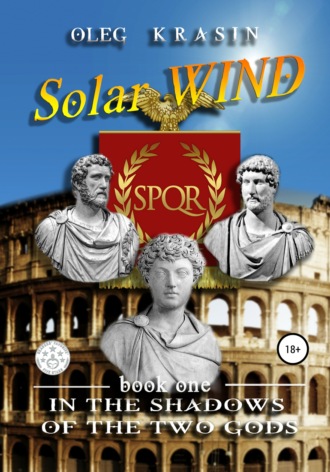
Полная версия
Solar Wind. Book one
Безопасно оплатить книгу можно банковской картой Visa, MasterCard, Maestro, со счета мобильного телефона, с платежного терминала, в салоне МТС или Связной, через PayPal, WebMoney, Яндекс.Деньги, QIWI Кошелек, бонусными картами или другим удобным Вам способом.
Примечания
1
Plato is an ancient Greek philosopher who lived in the IV-III century B.C.
2
Guy Petronius Arbiter (14-66) is a Roman writer, author of the satirical novel «Satyricon».
3
Publius Aelius Trajan Hadrian (76-138) was a Roman emperor in 138.
4
Logos (from Greek «word», «thought») – the World mind.
5
Marcus Ulpius Nerva Trajan (53-117) was a Roman emperor in 117. Adopted the future emperor Adriana under the influence of his wife Pompey Dam.
6
Apollodorus of Damascus (d. 129) is an architect of the Roman Emperor Trajan's era.
7
Vibia Sabina (85-137) was the wife of Emperor Adrian.
8
Antinous (111-130) is a lover and constant companion of the Roman Emperor Adriana, deified after death.
9
Ra is the Egyptian god of the sun.
10
Toga is the outerwear worn by men in ancient Rome
11
Salire (Latin) – jumping, dancing.
12
Frumentarii (Latin) were individuals who ran public bread shops and collected different information for the emperor.
13
Verissimus (Latin) is the truest, true.
14
Annius "Annales,” book 1., (translated by S.A. Osherov), Chrystomatia on early Roman literature, Moscow, 2nd edition, publishing house "Greek-Latin Cabinet of J.A. Shichalina," 2000, p.35
15
Genius is the spirit of the patron saint of men.
16
During the burial of the Roman emperors in the sky released an eagle, considered a bird of Jupiter.
17
Marcus Porсius Cato the Elder (234-149 BC) is a well-known Roman politician and writer.
18
Stola (Latin) – in the ancient Romans women's clothing in the form of tunics, which was worn on top of the bottom tunics and reached the ankles. The stola was a symbol of a legal marriage, and was the clothes worn by the family Romans.
19
I'm a Roman citizen! (Latin)
20
Citharode was a classical Greek professional performer (singer) of the cithara.
21
Cynic (from the Greek dog) is one of the Greek philosophical schools, followers of Socrates, who preached simplicity, escape from conventions.
22
Parks are the Roman goddesses of fate.
23
Celebrations in honor of Bacchus and Ceres on March 17. On this day, the young men wore toga virilis.
24
Toga virilis is a toga of maturity worn by the Romans when they came of age at the age of sixteen.
25
AD 134.
26
In ancient Greek mythology, the God of medicine and healing.
27
Sigma – a bed in the form of a Greek letter ∑.
28
Peristyle (Greek) garden, surrounded on four sides covered with colonnade.
29
Mucius Scaevola (Latin "Lefty") put his hand on the fire of the roaster to show Etruscan king Porsenna the courage of the Roman people.
30
Palanquin is a bed with curtains carried by slaves in their arms.
31
Domina (Latin) – Madam.
32
Baiae is a resort in ancient Rome.
33
Insula is a high-rise building in Rome.
34
Saturnalia is a holiday in honor of the god Saturn in December.
35
Parasite (Greek) is a slacker. In Rome, poor citizens entertained the hosts at the table.
36
The Nomenclator (Latin) is a slave or freedman who during the walk called the names of the oncoming people.
37
Libertas (Latin) – Freedom
38
It was believed that women also secreted seed.
39
Option (Latin Optio) is a centurion assistant.
40
Decurion (Latin Decurio) is the leader of the ten-man cavalry unit in the Legion.
41
Lupa (Latin) is a wolf, harlot
42
Fasces is a bundle of bandaged bars, symbolizing official power.
43
Simon Bar-Kohba was the leader of the Jewish uprising in AD 131-135.
44
The frumentarii, at first petty-officers connected with the conveyance of military dispatches. Many of them were then attached to the imperial service as a sort of secret police.
45
AD August 4, 135.
46
Virgil, The Aeneid, book 6, Publishing House of Fiction, Moscow, 1971, p.240
47
November 13, 137
48
There's a copper coin in Rome.
49
Consulars are persons who have held consuls’ positions.
50
The poem of the Roman poet Ovid in 3 books was considered indecent.
51
Bless you! (Latin)
52
Beams of knitting or birch rods stretched with belts. In Rome, the symbol of the protection of state power.
53
Martial "Golden Mean" (translated by F. Petroski), Library of World Literature, Ancient Lyrics, Art Literature Publishing, Moscow, 1968, p.470.
54
The master's office in the Roman house.



